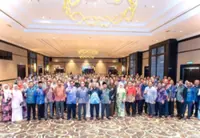Taylor’s University is the only private university in South-East Asia to enter Asia’s Top 50 in the recent QS Asia University Rankings 2023.
PLACED among the top 1% of the most influential universities globally based on the QS World University Rankings 2023, Taylor’s University remains the No.1 private university in South-East Asia for three consecutive years.
The education institution is also the only private university in South-East Asia to leap into Asia’s Top 50 according to the QS Asia University Rankings 2023.
“Demonstrating our commitment to balanced excellence in education, Taylor’s redesigned our curriculum, pedagogy, and assessment to the evolving education landscape by carefully curating the Taylor’sphere ecosystem – nurturing students based on the three intelligences of intellect, craft, and practical wisdom, in an atmosphere of creativity and collaboration,” says Taylor’s University deputy vice-chancellor and chief academic officer Prof Dr Pradeep Nair.
“The ecosystem aims to ensure students will not only have the right knowledge and job skills but also essential life skills and social networks to put into practice what they have learnt and find solutions to real-world problems.
“This means that to solve real-world problems, governments and organisations would need talents with fluent skills in the culture, language, and methodologies of multiple disciplines.
“Taylor’s education especially helps in developing problem-solving, critical thinking, evaluation, synthesis, and integration skills,” says Prof Dr Pradeep.
As part of its Taylor’sphere ecosystem, the university emphasises meaningful and innovative learning through its multidisciplinary learning experience (MLE) – being one of the pioneer institutions in the region to implement compulsory multidisciplinary projects across all its bachelor’s degrees.
“Providing students with the right environment, networks, and resources at the university level are crucial in enabling them to thrive in their future careers.
“Taylor’s guiding principle in our MLE approach is to equip students to live out their mission and goals through purpose-driven learning,” adds Prof Dr Pradeep.
Multidisciplinary projects
Recognising that Braille books are not only cost-consuming for manufacturing and sales, but are also heavy and often outdated for the visually impaired community to attain basic knowledge, students across the School of Medicine, the School of Engineering, and Taylor’s Business School faculties joined hands in a multidisciplinary project developing a 3D printed audible BraillePad.
The team, aptly named the Visionaries, was runner-up at the Medical Grand Challenge 2022 for their prototype’s entry in the Nascent Category, winning a cash prize of S$15,000.
At Taylor’s, multidisciplinary learning also goes beyond students’ collaboration as seen by a project undertaken by its academics titled The IMPACT Model: Imparting Transformation Through Industry-Linked Multidisciplinary Projects.
Led by Dr Douglas Tong Kum Tien, senior lecturer from the School of Engineering, Faculty of Innovation and Technology, the project bagged gold in the Science of Learning Award category at the 2022 QS-Wharton Reimagine Education Awards.
“As educators, we believe learning should be both informative and transformative for students,” says Dr Tong.
“The IMPART model uses industry-linked multidisciplinary projects learning pedagogy, 360-degree assessment and feedback by industry reflecting on experiences, and, learning from failure, understanding transformation in attitudes and behaviours as well as gaining new knowledge and skills.
“The cross-school collaboration between The Design School, School of Computer Science, School of Management and Marketing, and more within the university fosters collaboration skills outside students’ disciplines and opens up their understanding to appreciate different disciplinary perspectives.
“Project-based learning pedagogy which is a form of experiential learning provides deliberate opportunities for transformative learning,” he adds.
Go to university.taylors.edu.my for more information on Taylor’sphere.







